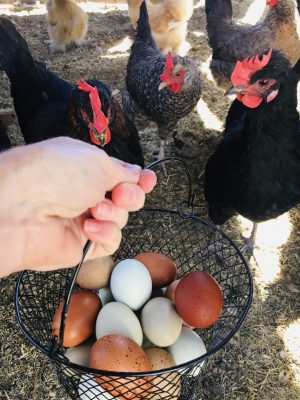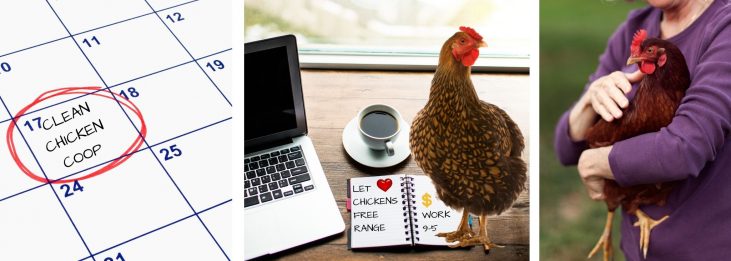
As long as you meet the housing, space, feeding, health and safety requirements of your chickens, you absolutely can own chickens and work all day. Once you have your coop and run set up and a routine in place, you will see that it is actually quite easy to own chickens and work your regular day job too!
This article will let you know 7 important requirements that are necessary if you want to become a responsible backyard chicken owner, but work a full time job.
- How Do I Take Care of Chickens and Work Full Time?
- 7 Important Requirements for Owning Chickens
- #1 Chicken Coop Setup
- #2 Chicken Run Requirements
- #3 Chicken Feeding Requirements
- #4 Being Attentive to Flock Health
- #5 Predator Proofing the Chicken Coop
- #6 Cleaning the Chicken Coop
- #7 Letting Your Chickens Free Range
- Conclusion: Can I Own Chickens and Work All Day?
How Do I Take Care of Chickens and Work Full Time?
M-F Chicken Chores Before Work
- Let chickens out of their coop and into their chicken run. (You can also install an automatic chicken door that will do this for you!)
- Feed your chickens and give them clean, fresh water.
- Do a visual inspection for injuries or illnesses.
M-F Chicken Chores After Work
- Collect eggs.
- Make sure chickens are locked in the coop at night.
- Put away all uneaten food, both chicken and other pet food.
Saturday & Sunday Chicken Chores for People that Work
- Let chickens out into the chicken run.(Or install an automatic chicken door.)
- Feed chickens in the morning.
- Clean and fill chicken water containers.
- One day each weekend, clean out nesting boxes.
- Let chickens free range with supervision.
- Collect eggs.
- Once a month: Spray down coop walls, nesting boxes and roosting bars with ACV(apple cider vinegar) and water spray. This will help to kill bacteria and parasites from taking over.
- 1-2 times a year do a deep cleaning of your chicken coop.
- Use your days off to pick up additional food and bedding as needed for your flock.
- Make sure chickens are locked up in the coop at night.
- Put away all uneaten food.
7 Important Requirements for Owning Chickens
#1 Chicken Coop Setup
A chicken coop should be big enough to house the number of chickens you have comfortably. Each adult chicken should be provided 2-4 square feet of space. Bantam chickens may only need 2 square feet and larger breeds, 4 square feet.
The chart below is for the average adult chicken requiring a minimum of 3 square feet of inside coop space.
| # ADULT CHICKENS | MINIMUM AMOUNT OF INSIDE COOP SPACE | DIMENSIONS IN FEET |
|---|---|---|
| 4 | 12 SQ FT | 2′ x 6′ 3′ x 4′ |
| 6 | 18 SQ FT | 2′ x 9′ 3′ x 6′ |
| 8 | 24 SQ FT | 2′ x 12′ 3′ x 8′ 4′ x 6′ |
| 10 | 30 SQ FT | 3′ x 10′ 5′ x 6′ |
| 12 | 36 SQ FT | 3′ x 12′ 4′ x 9′ 6′ x 6′ |
| 20 | 60 SQ FT | 3′ x 20′ 4′ x 15′ 5′ x 12′ 6′ x 10′ |
What Features Does a Chicken Coop Need?
Roosting Bars
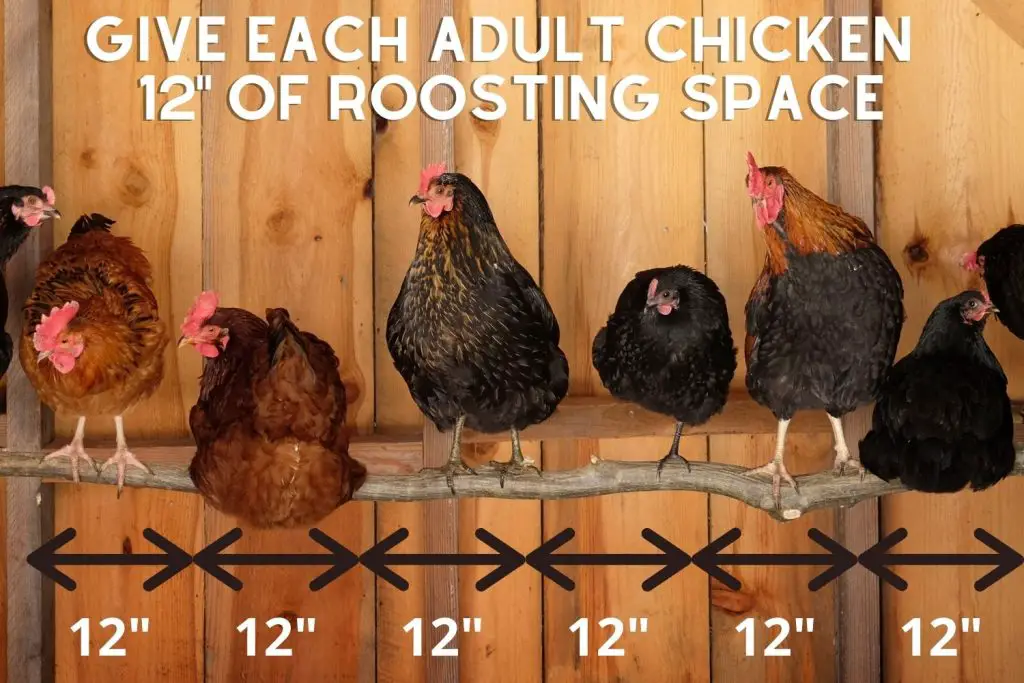
- Chickens like to roost at night and will instinctively always seek the highest place they can for safety.
- Roosting bars can be made from old branches or wood and should be 2″-4″ in diameter. The lowest bar should be higher than your nesting boxes and the highest bar should be no higher than 4 feet.
- Chickens can break their leg or develop bumblefoot with roosting bars that are higher than 4′.
- Chickens do not need to wrap their feet around a bar to roost, instead they like to rest on the bar at night.
- Each adult chicken needs 12″ of roosting space.
- Bantam adult chickens need 10″ of roosting space.
- Make sure that you provide enough roosting space, otherwise some chickens may end up sleeping on the floor of the coop.
Bedding
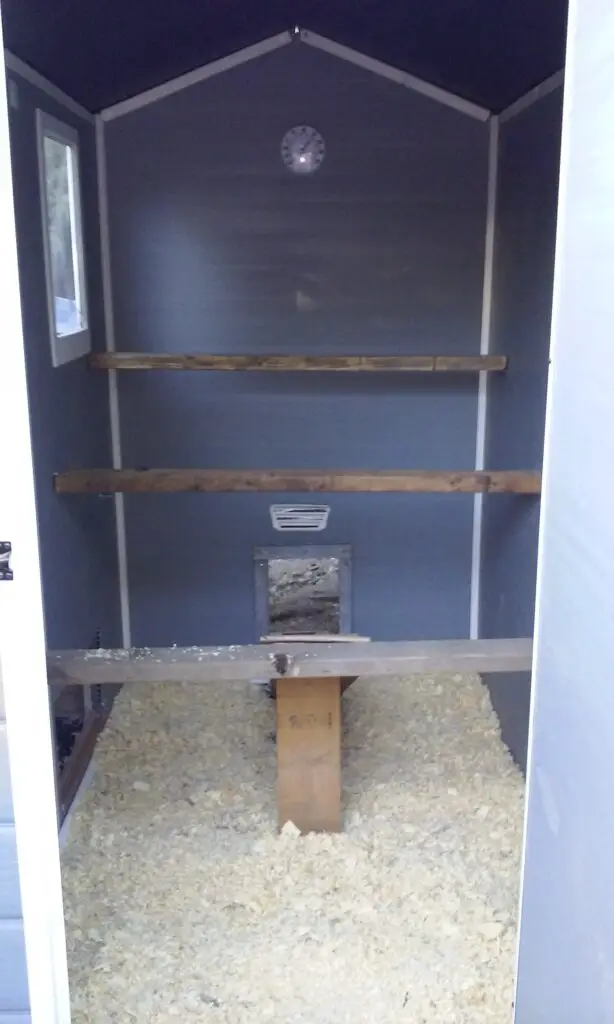
- A chicken coop needs to have a soft, absorbent material, both on the floor of the chicken coop and in the nesting boxes.
- This will provide a soft, comfortable spot for your hens to lay eggs and a soft, landing spot when jumping off the roosting bars.
- It will also absorb moisture from their dropping and help to decrease odor.
| NESTING MATERIAL CHOICES |
|---|
| PINE SHAVINGS |
| CEDAR SHAVINGS |
| HAY |
| STRAW |
| NESTING BOX MATS |
| SHREDDED PAPER |
| SHREDDED LEAVES |
| LAWN CLIPPINGS |
| SAND |
| HEMP BEDDING |
Nesting Boxes
- All chicken coops should have nesting boxes that contain a soft bedding for your laying hens.
- Nesting boxes should be up off the ground, but lower than the lowest roosting bar. This will help to protect them from some crawling insects and rodents.
- The proper box size for an adult hen is 12″L x 12″W x 12″D.
- Larger breed birds, such as the Giant Cochin and Jersey Giant need a little bit wider of a box, 12″L x 14″W x 12″D.
- Nesting boxes that are higher than the lowest roosting bar are likely to become roosting spots for your chickens at night. Chickens poop a lot at night, so this will result in chickens soiling the nesting boxes.
How Many Nesting Boxes Do I Need?
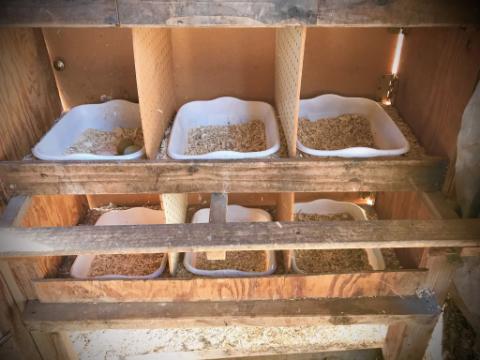
The general rule of thumb is to have 1 nesting box for every 4 hens. While this is the rule, you will most likely find that even if you have the recommended amount of nesting boxes, there will always be a select few nesting boxes that all of your hens insist laying in.
| # CHICKENS | # NESTING BOXES |
|---|---|
| 2-4 | 1 |
| 5-8 | 2 |
| 9-12 | 3 |
| 13-16 | 4 |
| 17-20 | 5 |
| 21-24 | 6 |
Ventilation
It’s important to provide protection for your flock from the elements, but equally important to provide airflow inside the chicken coop.
This can be provided by installing vents or windows in your coop, covered with 1/4″ hardware cloth (to prevent predators from getting in). These vents will allow hot air, moisture and carbon dioxide to leave the coop, but at the same time allow fresh air in.
- Proper ventilation will provide fresh air on a hot day and help to keep the smell of ammonia down in the coop.
- Cool weather brings on increased humidity. Combine increased humidity with chicken droppings and you have a breeding ground for bacteria. Good ventilation will help to keep the moisture level down. This is important because moisture breeds bacteria. Increased bacteria = increased diseases and illnesses.
Secure Door
Chickens need to be locked inside their coop every evening. Make sure that this is a secure door that will not allow predators in. If you are not in until later in the evening, you might want to invest in an automatic chicken coop door. You can set this to go up and down at scheduled times.
At the end of each day, chickens will instinctively retreat to the chicken coop to roost for the night. When a chicken is roosting for the night, it goes into a trance like state. It is at this time that they are the most vulnerable to predator attacks.
All it takes is one evening of not locking your chickens in the coop at night and you can lose your whole flock due to a predator attack. This is why it is so important to no matter how tired you are to always make sure they are locked in with a secure door.
#2 Chicken Run Requirements
How Much Space do Chickens Need?
An adult size chicken should be provided with a minimum of 8 square feet of space outside of the chicken coop. This will give them enough space to be able to carry out innate chicken behavior:
- Peck and scratch the ground to forage for food
- Dust bathe
- Preen
- Freely flap its wings
- Roost
| # CHICKENS | MINIMUM REQUIRED OUTSIDE SQARE FEET | DIMENSIONS |
|---|---|---|
| 4 | 32 SQ FT | 4′ x 8′ |
| 6 | 48 SQ FT | 4′ x 12′ 6′ x 8′ |
| 8 | 64 SQ FT | 8′ x 8′ |
| 10 | 80 SQ FT | 4′ x 20′ 5′ x 16′ 8′ x 10′ |
| 12 | 96 SQ FT | 3′ x 32′ 4′ x 24′ 6′ x 16′ 8′ x 12′ |
#3 Chicken Feeding Requirements
If you are working a 9-5 job and own chickens, you can tend to them in the morning before heading off to work. This includes cleaning out their watering container and filling it with fresh, cool water. During the day, chickens should always have access to clean, fresh water.
I offer my hens laying pellets that contains the correct amount of nutrients. You can buy it in 50# bags at your local feed store. In California a 50# feed bag of laying pellets costs around $19.
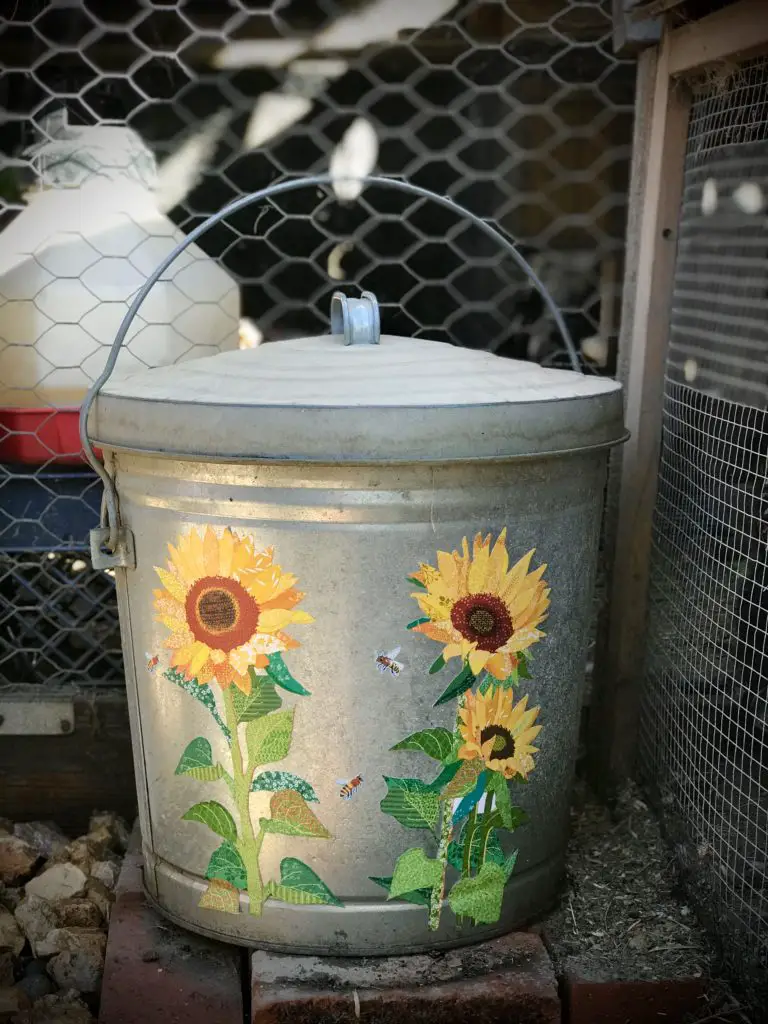
It is best to keep your chicken feed in a metal container with a secure lid. This way, rats and other chicken predators will not be able to get into it.
If you have laying hens, offer them oyster shell on the side. Laying hens need extra calcium. This helps to make the egg shells hard.
You shouldn’t mix this in with their feed because they can get too much calcium if you do this. A laying hen instinctively knows how much calcium her body needs and will adjust how much she eats accordingly.
How Much do Chickens Eat?
Each adult chicken requires 1/2 cup of feed per day.
| # CHICKENS | # CUPS CHICKEN FEED |
|---|---|
| 2 | 1 CUP |
| 4 | 2 CUPS |
| 6 | 3 CUPS |
| 8 | 4 CUPS |
| 10 | 5 CUPS |
| 12 | 6 CUPS |
| 16 | 8 CUPS |
| 20 | 10 CUPS |
| 24 | 12 CUPS |
| 32 | 1 CUPS (1 GALLON) |
How Much Water Does an Adult Chicken Drink?
“The average amount of water that an adult chicken drinks is 1 pint per day. This amount can vary greatly depending upon the outdoor temperature and the breed of chicken. Chickens should always have access to an unlimited amount of clean water.”
Backyard Chickens Mama Article: 9 Important Signs to Look For – Are Your Chickens Happy?
Can I Feed My Chickens Table Scraps?
“Yes, as long as you offer your chickens their regular feed first and your table scraps do not include sugary, salty, moldy or poisonous foods. Table scraps should not consist of more than 10% of their daily food intake.”
Backyard Chickens Mama Article: Is it Safe to Feed Chickens Table Scraps? 5 Important Tips
#4 Being Attentive to Flock Health
If you are working all day, in the morning when you go out to feed and water your flock, make it a point to visually scan your whole flock. Ask yourself the following questions:
- Are all your chickens there?
- Are any of them limping or missing any feathers?
- Watch the dynamics of your flock. Are any of your chickens bleeding? It is normal for them to have a certain “pecking order,” but it shouldn’t cause any bloodshed.
- Do you have a chicken that is getting picked on?
- Are all of your chickens active?
- Look for any that may be off in the corner or that may have their eyes closed.
Identifying Parasites

If you notice that one of your chickens is “off,” do a parasite check on them. Mites and lice like to hide at the base of feathers, especially in warm, moist areas such as under the wings and by the vent.
Check for tiny white, red or brown specks at the base of the feathers. Look inside the nesting boxes and on the underside of the roosting bars too.
| SIGNS OF PARASITE INFESTATION ON A CHICKEN |
|---|
| TINY WHITE, RED OR BROWN SPECKS AT BASE OF FEATHERS |
| PALE COMB |
| NOT EATING |
| LISTLESS |
| NOT LAYING EGGS |
| OFF IN A CORNER |
Treatment for Parasites
There are many natural ways that you can treat parasites with apple cider vinegar, diatomaceous earth, epsom salt and also using Dawn Dish Soap!
For more details on how to treat mites in chickens, read my article 5 Simple Ways to Get Rid of Mites on Chickens-Naturally
Prevention of Parasites
The number one way you can help to prevent parasites on chickens is to keep your coop clean. This includes cleaning out the nesting boxes too. Dirty coops attract rodents and various other chicken predators that bring parasites into your coop.
Plant herbs, plants and flowers around the perimeter of the chicken coop that are deterrents to predators.
For a list of what herbs, plants and flowers are excellent predator deterrents, read my article 5 Important Ways To Use Herbs Around Your Chickens.
#5 Predator Proofing the Chicken Coop
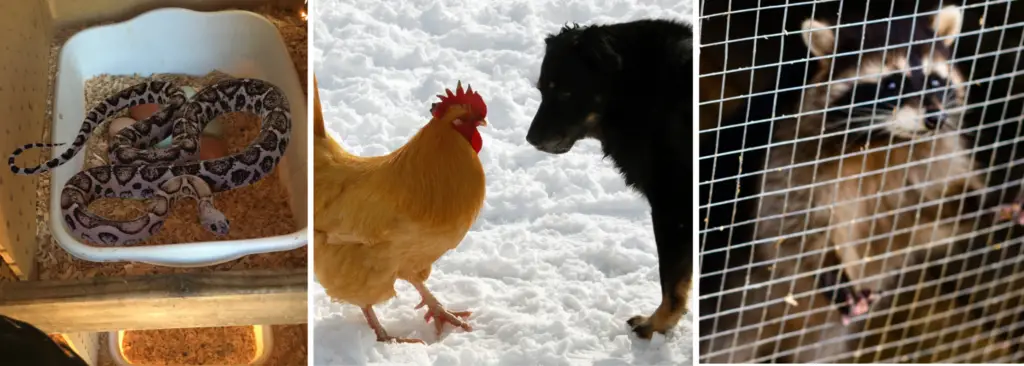
Depending upon where you live, it is your responsibility as a chicken owner to know what predators are common in your area and make modifications to your chicken coop and run to prevent attacks.
How to Predator Proof Your Chicken Coop
| PREDATOR PROOFING A CHICKEN COOP |
|---|
| LOCK CHICKENS IN A SECURE COOP EACH NIGHT |
| USE 1/4″ HARDWARE CLOTH FOR CHICKEN RUN AND COOP WINDOWS |
| BURY HARDWARE CLOTH 6″ AROUND PERIMETER OF COOP |
| INSTALL 2-STEP LOCK TO DETER RACCOONS |
| FIX ANY BROKEN DOORS/LATCHES |
| SEAL ANY HOLES |
| PUT CHICKEN FEED IN METAL CAN WITH SECURE LID |
| KEEP PERIMETER OF COOP CLEAN OF CLUTTER |
| DON’T LEAVE ANY CHICKEN FEED OUT OVERNIGHT |
| PLANT HERBS, PLANTS FLOWERS THAT HELP DETER PREDATORS |
How to Identify Predator Attacks
According to a Backyard Chickens poll, some of the most common predators are raccoons, birds of prey(hawks, owls and eagles), dogs and fox.
For details on how to identify what may have attacked your chickens and how you can prevent an attack, read my article 11 Common Backyard Chicken Predators – How to Best Prevent Attacks.
#6 Cleaning the Chicken Coop
Can You Get Sick Cleaning Out the Chicken Coop?
“Cleaning a chicken coop can make you sick, so it is imperative to take precautions to minimize your risk of contracting diseases that can be passed from chickens to humans. Flock owners can contract diseases while cleaning a chicken coop either by direct contact or by breathing in dust particles.”
Backyard Chicken Mama’s Article: Can Cleaning a Chicken Coop Make You Sick? (9 Tips)
How to Prevent Chicken to Human Illnesses
The number one way to prevent chicken to human illnesses is to make sure you wear protective gear when you are cleaning out your chicken coop.
| HOW TO DRESS WHEN CLEANING A CHICKEN COOP |
|---|
| RESPIRATOR OR MASK |
| GOGGLES |
| GLOVES |
| LONG PANTS, LONG SHIRT |
| CHICKEN COOP BOOTS |
How Often do I Need to Clean a Chicken Coop?
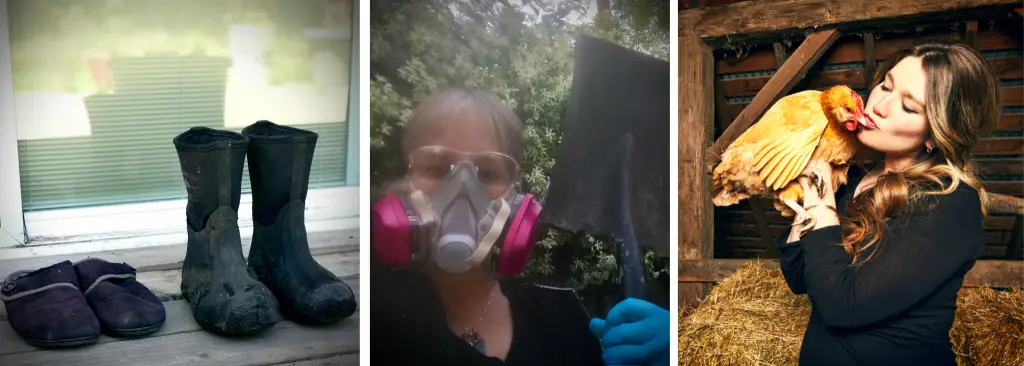
I highly recommend using the “deep litter method” for cleaning out your chicken coop. This will be convenient for working chicken owners because it only requires a deep clean 1-2 times a year!
- Add 4-6″ of bedding such as pine shavings to the bottom of your chicken coop.
- Chickens will poop and the litter will absorb the moisture and smell.
- Your chickens will turn the bedding each day.
- Bedding will gradually decompose.
- Add more bedding as the bedding decomposes or if it begins to smell.
- After 6 months, remove all bedding and replace with 4-6″ of fresh bedding.
Don’t throw away this material! It is excellent to add to your garden! But don’t add it straight to your garden. There are few steps that you need to take first. For step by step instructions on how to properly add this soil to your garden, read my article How to Make Garden Soil Out of Chicken Manure.
Nesting boxes should always be kept clean. As long as your chickens aren’t roosting in their nesting boxes at night and soiling them, the bedding will not need to be changed more than one time a week.
#7 Letting Your Chickens Free Range
Use your days off to let your chickens out to free range. It is important to be there to keep an eye on them, just in case there are any predators around. Even a neighborhood dog on the loose can wreak havoc on a flock of chickens.
Can Chickens Stay in the Coop all Day?
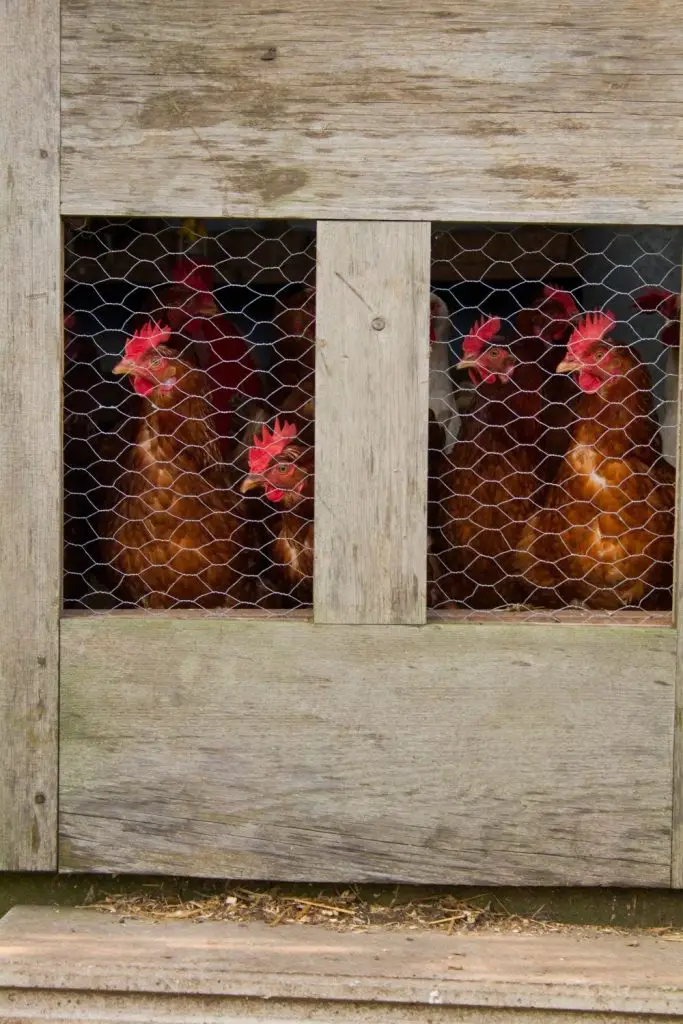
The only time chickens should stay in their coop all day is when you are trying to get them used to where their new “home” is. This usually takes a couple weeks. It is best to have a chicken run that is attached to your coop that will provide sufficient space for them to carry out innate chicken behavior.
Do I Have to Let My Chickens Free Range?
While it is more beneficial to allow your chickens time to free range, it is not mandatory if you have sufficient space for your chickens in a chicken run.
Pro Tip: By allowing your chickens time to free range, they will have access to more natural greens and bugs. Chickens that are allowed to free range will be healthier and will also lay eggs that are healthier for you!
Conclusion: Can I Own Chickens and Work All Day?
To be a responsible chicken owner, make sure the following requirements of your chickens are met:
- Chicken Coop Setup Requirements
- Chicken Run Requirements
- Feeding Requirements
- Being Attentive to Flock Health
- Predator Proofing the Chicken Coop
- Cleaning the Chicken Coop
- Letting Your Chickens Free Range
As long as you meet the needs of your chickens, it is possible to work a full time job and still have enough time to put in to responsibly raise a flock of chickens.
Once you get your coop and chicken run set up properly, you will find that falling into a routine of caring for your chickens before and after work and giving extra care on the weekends is very doable!

